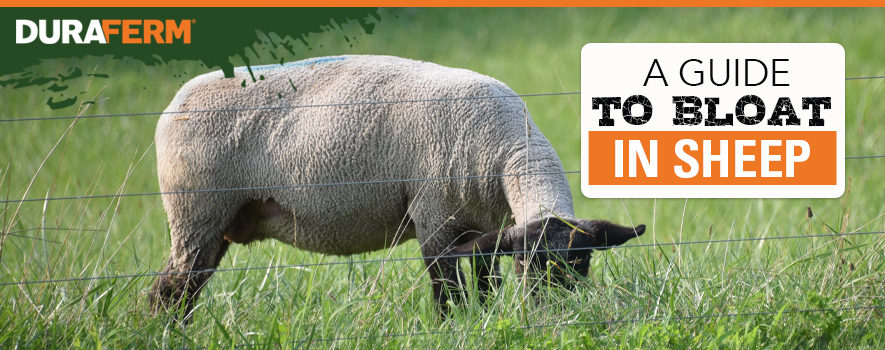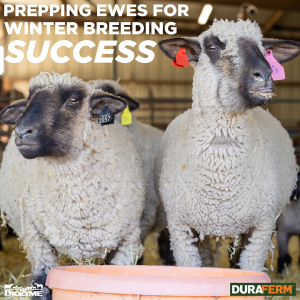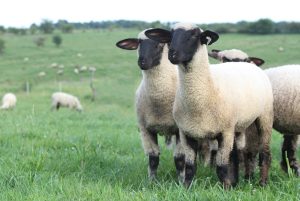
Bloat. It’s that uncomfortable feeling that you might experience at the first holiday potluck at your future in-laws. You’ve grazed your way through the day, munching on wonderful specialties from the wonderful cooks’ and bakers’. At the end of the day, you are miserable, full beyond belief, perhaps even bloated, but you didn’t die. However, when sheep experience bloat and it isn’t treated, it can be fatal.
Bloat in sheep is simply a surplus of gas in the rumen. Bloat is typically caused by two culprits in mature sheep: excess grain or overeating fresh, lush grass in the spring. When sheep eat too much grain too fast or consume the lush legumes like clover or alfalfa, the gases build up in the rumen and cannot escape fast enough, causing bloat.
Signs and Symptoms
Sheep offer several symptoms of bloat. The main sign is a swollen left abdomen. Other tell-tale signs include restless acting sheep that get up and down repeatedly, kicking at their belly, grunting and extending their neck and head. A bloated sheep might lay down in distress and not be able to get back up. They will also have increased urination and pooping. When pastures and forages are involved, frothing of the mouth might be apparent, which is why pasture bloat is also referred to as frothy bloat.
Treatment
If you suspect your sheep is bloated, you will want to treat it immediately. The longer bloat goes untreated, the more likely it is to result in death. If you are not comfortable diagnosing your sheep with bloat or not sure how to treat it effectively, contact your local veterinarian for assistance as soon as you see a sheep showing symptoms.
Since bloat is essentially the buildup of gases in the rumen, you need to release those extra gases to give the animal relief. If you don’t have time to wait for your vet, you can try to release the gas a few different ways. Try to get your sheep to belch by lifting up its side and pushing in on the stomach to get the gas out. You can also create a drench with baking soda and water put that down the animal’s throat, which should help release the gas.
Some bloat medications do exist if the home remedy of baking soda and water doesn’t work. Check with your local vet on availability and his or her recommendation for what you should keep on hand. Even if you do get your sheep to belch or expel the gas from its rumen, you might want a vet to examine it for any secondary illnesses or other infections.
Prevention
As with most things, being proactive is generally better than being reactive, and preventing bloat is recommended, if you can. There are several ways to prevent bloat in your flock.
To prevent grain bloat, think about the grains you are feeding. Bloat is most common with barley and wheat but can also occur with other grains. Also consider the way the grain is processed. Crushed grain increases the release rate of carbohydrates, leading to bloat.
Another way to prevent bloat is monitor the legumes and forages that your flock is grazing. If you are turning your sheep out in the spring, turn them out gradually, and for short periods of time. Also try to avoid turning sheep out when the pasture is wet as moisture leads to bloat.
As with any livestock, change diets gradually, regardless of if you are talking grain or forages. If changing rations, slowly increase any grains as not to cause bloat. And if your sheep are on an all-grain diet such as a dry-lot situation, be sure to provide them plenty of hay. A high-quality source of hay or silage helps in the digestion process.
Including Amaferm®, in your flock’s diet can also help mitigate bloat. Amaferm is a precision prebiotic designed to impact intake, digestibility and absorption of nutrients. Feeding Amaferm, either through a ration or through a high-quality mineral program like DuraFerm® will aid in digestion. Amaferm is designed to enhance digestibility by amplifying the nutrient supply for maximum performance.
Feeding DuraFerm with the Amaferm advantage will not only assist in digestibility, helping prevent bloat, but the DuraFerm Sheep Concept•Aid® line contains balanced levels of high-quality vitamin and minerals required for growth, breeding and lambing. DuraFerm is especially beneficial when fed 30 days before lambing through breeding. DuraFerm Sheep Concept•Aid comes in three formulas: a loose mineral, a loose mineral with HEAT® to help maintain core body temperature; and a protein tub with 16% added protein.
Imagine how miserable a sheep in your flock is when bloat hits. Try to avoid that misery in your flock with some preventative measures like gradual feed changes, plenty of good forage and high-quality nutrition that includes Amaferm.

